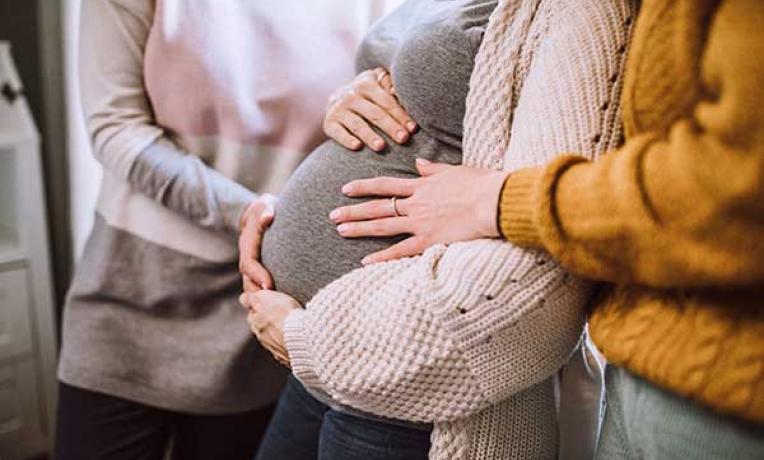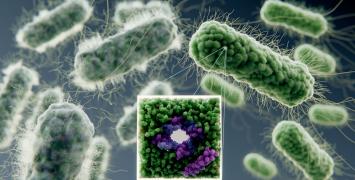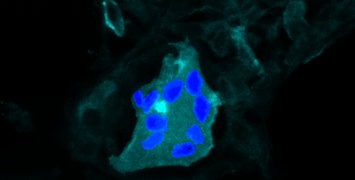Supporting emotional wellbeing of mums boosts health of newborns
The tails of our DNA – telomeres – are the focus of many aging studies, as their length affects our health and longevity. A new study by ERC grantee Sonja Entringer shows that supporting the psychological wellbeing of mothers during pregnancy could have a positive effect on our telomeres at birth, boosting our long-term health. We spoke with her on the occasion of the publication of a paper in the American Journal of Psychiatry based on a collaboration between her team at the Charité Universitätsmedizin Berlin, and partners in Finland and the USA.

How did you get involved in your field of research?
I was trained in psychobiology, which studies the interface between biological systems and behavior. Early on in my career, I became interested in the concept of fetal origins of health and disease risk. This suggests that the origins of common disorders can, in part, be traced back to the fetal period. I specialised in maternal stress during pregnancy as a risk factor.
How are you able to measure the health prospects of newborn babies?
I study telomere length at birth. Telomeres are caps at the end of our chromosomes that protect them from damage during cell division. We are all born with relatively longer telomeres but as we grow older, with each cell division, our telomeres shorten. When they reach a critical length, the cell stops dividing or dies. Because of this, the telomere system is very important for cellular ageing. Short telomere length seems to play a causal role in a wide range of physical and psychological disorders, as well as mortality risk. If you already have shorter telomeres at birth, it may have important implications for health and disease risk in later life.
My research team and others have been able to show that there is developmental plasticity of this system, which means that it is responsive to environmental conditions. So changes in telomere biology during fetal life seem to determine to some extent what happens to our health and disease risk later in life.
Watching this video you are accepting Youtube cookies policy
What research methods do you employ?
We carry out observational cohort studies where we investigate mothers’ psychological and biological state during pregnancy and then collect blood samples at birth and (in some cases) follow up on the children during the first few years of their lives. In our latest research, we were able to access very rich data from Finland on more than 900 pairs of mothers and babies. This allowed us to study associations between the mothers’ psychological state during pregnancy and the telomere length of their newborn babies measured in cord blood.
Maternal prenatal positive psychological factors really can have a long-lasting impact on fetal development, and that may in turn have lifelong consequences for health, disease risk and ageing
What are your main findings?
There have already been several studies that link maternal factors to fetal telomere length, but they mainly looked at mothers living in disadvantaged or sub-optimal conditions (stress, obesity, medical risk factors, poor diet, environmental toxins…). But there is now a growing recognition that positive emotions and psychological resilience have a protective effect on health and disease risk. These effects are not just the opposite of stress, but rather an independent phenomenon.
It seems that positive emotions can help individuals to recover more quickly from the negative physiological impacts of stress and prevent negative effects on telomere length. This has already been shown in adults, but our study is the first time these effects have been demonstrated in pregnant women and their newborn children.
By conceptualising and computing a ‘resilience factor’, we found that the more psychologically resilient the mothers were during pregnancy, the longer the telomere length of their newborn babies. The implications are that maternal prenatal positive psychological factors really can have a long-lasting impact on fetal development that is biologically embedded, and that may in turn have lifelong consequences for health, disease risk and ageing.
Policy measures to support the wellbeing of pregnant women could go a long way to promote both the health of pregnant women and future generations of children
What does this mean in practice? How could your findings help shape medical interventions and policies in the future?
The beneficial effects of resilience underscore the importance of attending to mothers’ psychological wellbeing during pregnancy. Our research suggests that there is a need to identify vulnerable women early in pregnancy, and to establish clear guidelines for intervention in order to promote psychological resilience. Policy measures to support the wellbeing of pregnant women (e.g. establishing a structure for routine screening procedures during prenatal care visits to identify women at risk and provide them with personalised and targeted support, right to parental leave for the mother and the father, etc.) could go a long way to promote both the health of pregnant women and future generations of children.
BIO
Sonja Entringer is a Professor of Medical Psychology at Charité Universitätsmedizin Berlin, and an Adjunct Associate Professor at the Department of Pediatrics and the Development, Health and Disease Research Program of the University of California, Irvine. She examines the interface between biological, social and behavioral processes in human pregnancy, with an emphasis on outcomes related to fetal development, birth outcomes, and subsequent long-term health.






